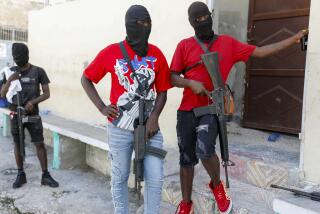South Africa Tries to Mediate a Peace Deal in Ivory Coast
- Share via
DAKAR, Senegal — France evacuated more of its citizens from Ivory Coast on Thursday after days of anti-French violence, and opposition leaders of the West African country met with South African President Thabo Mbeki, who is trying to mediate a new peace deal.
Ivory Coast was calmer after waves of rioting and looting that broke out Saturday. Government ministers called on citizens to return to work, some shops reopened and taxis were back on the streets.
The French military has flown more than 1,000 civilians out of the country, and French officials say thousands more want to leave.
The British military is sending 300 troops and a warship to Ghana to evacuate about 400 British residents from Ivory Coast. Several other countries and the United Nations also organized evacuations.
Ivorian opposition leaders flew to Pretoria, South Africa, for talks with Mbeki, who had been given the mandate by the African Union to organize negotiations. He has traveled to Ivory Coast and met with President Laurent Gbagbo, announcing afterward that the Ivorian leader was committed to negotiating a peace deal.
Alassane Ouattara, an exiled leader who was prevented from running for president in 2000, and Alphonse Djedje Mady, leader of an alliance of opposition parties, met Mbeki on Thursday in South Africa. But Mbeki’s office said that representatives of rebel groups holding northern Ivory Coast were not present.
Gbagbo strongly criticized France’s handling of the crisis.
Government forces that have been attacking rebels in the north bombed French peacekeepers Saturday, killing nine, along with an American aid worker.
France retaliated by destroying the small Ivory Coast air force, undermining the government’s new thrust to defeat the rebels.
Anti-French riots swept the country, and mobs targeted French businesses and citizens. Dozens died, according to Ivorian officials and hundreds were injured in the violence.
Civil war broke out in 2002 and the country is divided between northern rebels and southern loyalists, with peacekeepers arrayed in between. Before the latest riots, anti-French sentiment had focused on the role of French forces as peacekeepers.
Many people in the south believe that the French were responsible for stopping government forces from defeating the rebels.
France has about 4,000 troops in the country and the United Nations has about 6,000 peacekeepers under a separate mandate to monitor a cease-fire. The U.N. peacekeepers come from 48 countries; nearly half are from Bangladesh.
An estimated 15,000 French citizens lived in Ivory Coast. The former French colony is a major cocoa producer and for decades was one of the most stable and prosperous countries in West Africa.
The International Committee for the Red Cross and U.N. agencies warned that many people in north and west regions were suffering because the water supply and power have been cut since the crisis began.
Ivory Coast officials also confirmed Thursday that 4,000 prisoners escaped in the violence over the weekend.
France is seeking a U.N. Security Council resolution imposing an arms embargo against Ivory Coast, but the Security Council has postponed a decision to give Mbeki’s peace initiative a chance to succeed.
Reacting to fears that the conflict in Ivory Coast could destabilize West Africa, Nigerian President Olusegun Obasanjo also has become involved. He said he would call an emergency meeting of West African leaders.
More to Read
Sign up for Essential California
The most important California stories and recommendations in your inbox every morning.
You may occasionally receive promotional content from the Los Angeles Times.













